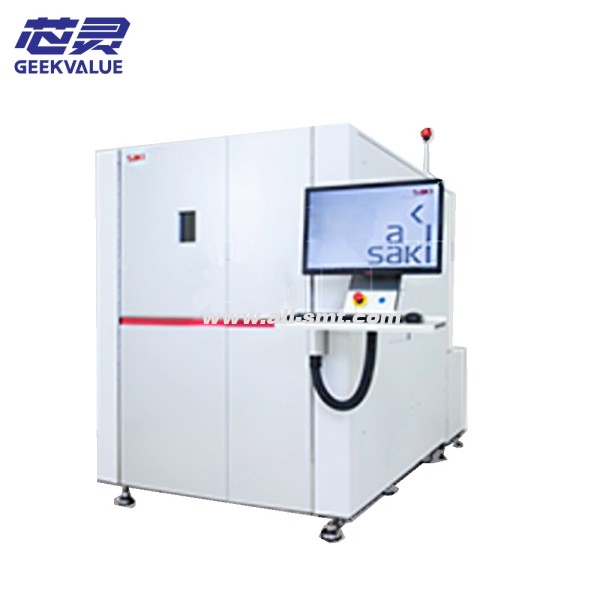As SMT (Surface Mount Technology) production lines become increasingly automated and complex, ensuring product quality at every stage is more critical than ever. That’s where AOI (Automated Optical Inspection) comes in—a powerful quality control solution used to detect component placement issues, solder joint defects, and various PCB anomalies.

But with so many AOI machines available today—2D, 3D, inline, offline, entry-level, AI-enhanced—how do you choose the right AOI for your SMT line?
In this comprehensive guide, we’ll break down the selection process step by step. Whether you’re building a new SMT line or upgrading your inspection systems, this article will help you make a smart, ROI-focused decision.
What Is AOI and Why It Matters
AOI is a vision-based inspection technology used in electronics manufacturing to automatically inspect PCB assemblies for defects such as:
Missing components
Misalignment
Solder bridges
Insufficient solder
Tombstoning
Lifted leads
Modern AOI systems utilize high-resolution cameras, 2D/3D imaging, and AI algorithms to inspect boards faster and more accurately than human inspectors.
Benefits of AOI:
Reduces human error
Improves product quality
Cuts down rework and returns
Enables traceability and SPC reporting
Increases overall production efficiency
Step-by-Step Guide to Choosing the Right AOI
Step 1: Define Your Inspection Goals
Before looking at models or prices, ask yourself:
Where will the AOI be used? (pre-reflow, post-reflow, post-wave)
What defects do you need to detect?
What is your target inspection speed and throughput?
How complex are your boards? (e.g. 0201 components, BGA, QFN)
Knowing your inspection objectives helps narrow down the right AOI type and configuration.
Step 2: Choose Between 2D vs. 3D AOI
| Feature | 2D AOI | 3D AOI |
|---|---|---|
| Inspection Method | Top-down camera images | 3D height measurement |
| Accuracy | Good for simple boards | Best for complex solder joints |
| Defect Detection | Limited for height issues | Excellent for coplanarity, solder volume |
| Cost | Lower | Higher |
When to choose 2D AOI:
Low-complexity PCBs
Budget-constrained projects
Visual checks only (e.g., missing, polarity)
When to choose 3D AOI:
High-reliability industries (automotive, aerospace, medical)
Small pitch components, BGA/QFN
Need for solder volume, height, coplanarity analysis
Step 3: Inline vs. Offline AOI: Which Do You Need?
Inline AOI is installed directly in the SMT production line and inspects boards automatically as they move from one station to another.
Offline AOI is a stand-alone system where boards are manually loaded for inspection.
| Type | Best For | Pros | Cons |
|---|---|---|---|
| Inline AOI | High-volume production | Fast, automated, real-time | Higher cost, takes space |
| Offline AOI | Prototyping, small batches | Cost-effective, flexible | Slower, manual handling |
Tip: For high-throughput factories, inline 3D AOI is a must. For R&D labs or small-batch production, a cost-effective offline 2D AOI might be sufficient.
Step 4: Check Inspection Speed and Accuracy
Modern AOI machines can inspect at speeds ranging from 30 cm²/sec to over 60 cm²/sec, depending on resolution and processing power.
Factors to consider:
Component density: More parts = more inspection time
Camera resolution: Higher resolution = better defect detection
Algorithm efficiency: Some AOI systems use AI to speed up decision-making
Pro tip: Always balance speed with inspection accuracy. A faster machine that misses defects is more costly in the long run.
Step 5: Evaluate Software Capabilities
AOI software is just as important as the hardware. Look for features like:
Easy offline programming
Component library management
Defect classification with AI
SPC data reporting
Integration with MES/ERP systems
Remote access and troubleshooting
Bonus: Some AOI software allows for automatic program generation from CAD data, drastically reducing setup time.
Step 6: Consider Machine Footprint and Line Compatibility
Make sure the AOI machine fits in your SMT line:
Standard PCB sizes? (e.g., 50x50mm to 510x460mm)
Can it handle dual-lane or double-sided boards?
Is the conveyor height and SMEMA communication compatible?
Always check equipment dimensions, power requirements, and air pressure needs before buying.
Step 7: Think About Future Expansion
Ask yourself:
Will your product mix become more complex?
Will you need more inspection stations as you scale up?
Will you require additional AOI units for pre-reflow or SPI?
Choosing a modular, upgradeable AOI system will help future-proof your production.
Step 8: New vs. Refurbished AOI Machines
If budget is a concern, refurbished AOI systems can be a smart investment. However, always consider:
Warranty and support availability
Spare parts sourcing
Machine calibration status
Software version and license status
Many SMT solution providers, like GEEKVALUE - SMT, offer fully tested, serviced, and upgraded used AOI machines at competitive prices.

Step 9: Compare Top AOI Brands
Some of the most respected AOI brands include:
| Brand | Key Features |
|---|---|
| Saki | High-speed 3D AOI with AI defect detection |
| Koh Young | Industry leader in true 3D AOI and SPI |
| Mirtec | Strong software, reliable hardware |
| CyberOptics | Precise metrology-grade inspection |
| Omron | Full-line automation compatibility |
| ViTrox | Good value and flexibility for SMEs |
Tip: Don’t just look at brand names—focus on local support, training, and ease of use.
Step 10: Request Live Demo or Sample Test
Before purchasing, ask your supplier to:
Run a demo on your real PCB samples
Provide defect detection reports
Showcase inspection speed and false call rates
Demonstrate software usability
This is the best way to validate the AOI machine for your actual production needs.
AOI Buyer Checklist
Before making your final purchase, go through this quick checklist:
✅ Defined inspection needs (speed, component size, type)
✅ 2D vs. 3D decision made
✅ Inline vs. offline format selected
✅ Verified software capabilities
✅ Confirmed machine footprint & compatibility
✅ Clarified support & warranty terms
✅ Checked for training availability
✅ Evaluated long-term upgrade paths
✅ Received quotation with full breakdown
✅ Tested sample boards or watched demo
Real Example: Choosing the Right AOI
Client: Shenzhen-based EMS Manufacturer
Product: Medical electronics (QFN + BGA-heavy boards)
Challenge: Too many false calls with old 2D AOI
Solution: Upgraded to inline Saki 3Di AOI with AI classification
Result:
False calls reduced by 70%
Increased first-pass yield
Programming time reduced from 6 hours to 1.5 hours
ROI achieved in 10 months
Final Thoughts: AOI Is a Long-Term Investment
Choosing the right AOI for your SMT line is more than just comparing prices or brands. It’s about aligning inspection capabilities with your production goals, quality standards, and growth plan.
A well-chosen AOI machine can:
Prevent thousands of dollars in rework
Strengthen customer trust
Meet industry certification requirements
Boost your brand's reputation for quality
If you're unsure where to start, work with a reliable SMT partner who offers consulting, machine sourcing, training, and after-sales support.
Need Help Selecting an AOI Machine?
At GEEKVALUE - SMT, we specialize in:
AOI machine sales (new and refurbished)
In-depth needs analysis
On-site installation and training
Repair and spare parts support
Full SMT line consultation
📞 Contact us now to get a customized quote and expert guidance on choosing the perfect AOI for your production line.



